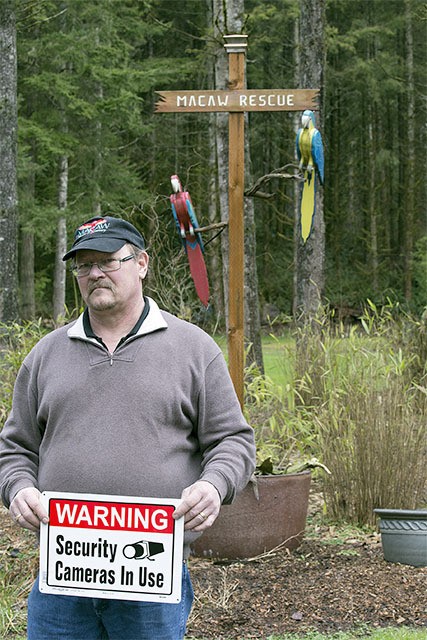Bob Dawson runs the non-profit Macaw Rescue & Sanctuary in Carnation; a 20-acre sanctuary, plagued with a 50-bird heist on Sunday, Feb. 22.
“The birds that were taken were typically smaller birds in some of the buildings closer to the road (up front),” Dawson explained in his home at the sanctuary on Friday, Feb. 27.
Dawson said the sanctuary holds roughly 800 birds and is the largest Macaw sanctuary in Western Washington. It has nested in Carnation for 12 years, but hd said the theft is a first for him.
The stolen birds were: Blue quakers, parakeets from South America who were taken from a “flight” full of green birds; bar-eyed cockatoos, whose gender is determined from their eye color; a pair of rose-breasted cockatoos; and Senegal, Meyers and red-bellied parrots that were targeted in a cockatoo house, that was home to 300 small birds for the winter months. Most birds were of the African species.
Dawson explained smaller birds are easier to pick up and net at night, while bigger birds are louder and are more likely to bite. Transporting 50 birds takes about an hour for those familiar with proper handling. He suspects the systematic thieves are individuals he’s taken on a tour.
“They knew what they were going for,” he stated. “This tells me that these people knew birds.”
No dead birds or escapees were found around the perimeter, so the possibility that the birds simply escape was ruled out early on.
Dawson has worked with birds since he was 6 years old, which explains why, when asked to pose for a photo, he apologizedfor not being able to smile much.
He estimated the missing birds’ value at $10,000, which he called a “conservative figure” compared to a retailer’s calculation.
“I don’t deal in dollars,” Dawson explained. “At our sanctuary, when a bird comes to live with us, there’s no price on it —we don’t adopt out and we don’t place values on them… Macaws are about a buck and a quarter to take care of.”
“When people place birds with us,” he said, “they become more or less a part of our family because they don’t relinquish them and sign them away. The people are contributors, some of them volunteer out here.”
The city of Carnation is policed by the King County Sheriff’s Department, which is on the thieves’ trail.
“The theft of these birds is an exceptional crime. We have a detective working on the case,” said BJ Myers, sheriff’s spokesperson, in a phone interview. “We’ve dealt with stolen animals, but certainly nothing on the magnitude of 50 or so rare birds.”
For now, Dawson said he’s working on installing surveillance cameras on the premises, a task that will take roughly $10,000 after discounts and non-profit tax breaks.
Dawson is also microchipping every bird on site to form a database of his flock. Each microchip costs $5; he said chipping 50 birds a day is an eight-hour task, so it’ll take the “better part of the month” to finish.
While authorities follow leads, Dawson also said volunteers and board members from around the country are scouring Craigslist and other for-sale websites for the missing birds and working on developing a reward fund.
“That will be our next step because there’s no loyalty among thieves,” Dawson stated.
He offered a grace period, giving the thieves the opportunity to drop off the missing birds at any shelter or veterinary office with no questions asked, but it won’t last for long.
If the birds aren’t recovered soon, “I’ll rescind that and go to the full extent of the law,” he said.

A trio of Amazon parrots huddles together at the Macaw Rescue and Sanctuary near Carnation. All of the 800 or so birds are slated for microchipping, since the theft of about 50 birds.

